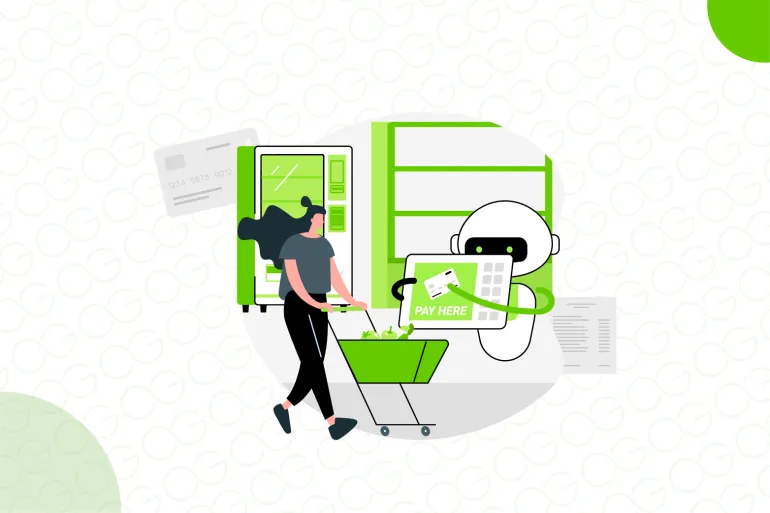The Future of Retail: A Glimpse into What's Coming Next
The retail industry is no stranger to change. Over the decades, it has evolved from simple village markets and Greek agoras to high-street shopping malls and now to mobile app-based marketplaces. According to Wikipedia, retail is defined as "the process of selling consumer goods or services to customers through multiple channels of distribution to earn a profit." This definition underscores the complexity of today's retail landscape, where traditional practices have been transformed by technological advancements and changing consumer behaviour.
Gone are the days when retail was a straightforward process of manufacturing, packaging, and selling through wholesalers and retailers. Today, retail is a dynamic, tech-driven ecosystem that caters to a wide array of channels—online, offline, and everything in between. With the rise of mobile apps, e-commerce platforms, and consumer-to-business (C2B) models, the industry has shifted dramatically, and the future promises even more revolutionary changes.
So, where is retail headed next? Let's take a closer look at the emerging trends and innovations that will shape the future of retail.

Modernize Your Retail Operations – Explore Ginesys' Cutting-Edge Solutions Today!
1. The Role of Technology in Shaping Future Retail
The future of retail will be inseparably tied to technology. As customer expectations rise and competition intensifies, retailers will increasingly depend on advanced technological solutions to stay ahead. From artificial intelligence (AI) to augmented reality (AR), retailers are adopting cutting-edge technologies to enhance customer experiences and streamline operations.
Artificial Intelligence and Machine Learning
AI and machine learning (ML) are set to revolutionise every aspect of retail, from personalised recommendations to inventory management. AI algorithms can analyse customer data in real-time to offer personalised shopping experiences, predict demand, and optimise pricing strategies. For example, AI-powered chatbots are already helping retailers provide 24/7 customer service, while ML models forecast inventory needs, ensuring that the right products are always in stock.
Augmented Reality (AR) and Virtual Reality (VR)
AR and VR technologies will redefine how customers interact with products. With AR, customers can visualise how a piece of furniture would look in their home or how a pair of shoes would fit without physically trying them on. VR could take online shopping to the next level by creating immersive, 3D shopping environments where customers can explore products in a virtual store.
The Internet of Things (IoT)
IoT technology will play a significant role in the retail future. IoT-enabled devices, such as smart shelves and sensors, can track product movements, monitor stock levels in real-time, and automatically reorder items when necessary. Additionally, IoT will help retailers offer more personalised in-store experiences by tracking customer preferences and suggesting products based on past behaviour.
2. The Emergence of Smart Stores
In the future, physical stores won't disappear, but they will transform into "smart stores." These are stores that leverage technology to provide a seamless, personalised shopping experience. The idea is to blend the best aspects of online shopping—like convenience and personalization—with the tactile, immersive experience of physical retail.
In-Store Mobile Apps for Enhanced Shopping
Retailers are already experimenting with in-store mobile apps that provide real-time product information, customer reviews, and personalised discounts. Shoppers can use these apps to scan items in-store, read more about the products, and even add them to their virtual shopping baskets. This bridges the gap between the digital and physical worlds, making the in-store shopping experience more interactive and convenient.
Digital Shelves and Smart Displays
Digital shelves are expected to become more common in retail stores. These smart shelves use electronic labels that can dynamically change product prices and promotions in real-time, based on demand, stock levels, and competitive pricing. Smart displays can also showcase tailored ads and product recommendations, further enhancing the shopping experience.
Fully Automated Stores and Self-Checkout
Retailers like Amazon have already introduced fully automated stores, where customers can simply pick up items and leave without going through a traditional checkout process. The future of retail will likely see widespread adoption of scan-and-go technology, camera-based checkout systems, and frictionless payment methods. Customers can enjoy a faster, more efficient shopping experience without waiting in line.

3. The Impact of Data-Driven Retailing
Data has become the new currency in retail, and its role will only expand in the future. Retailers that leverage data effectively will have a competitive edge, allowing them to make more informed decisions, enhance customer experiences, and drive business growth.
Predictive Analytics for Better Decision-Making
Predictive analytics will help retailers anticipate customer needs, forecast demand, and optimise inventory. By analysing historical data, sales trends, and external factors (like weather or seasonal events), predictive analytics can provide insights into future customer behaviour, helping retailers make smarter purchasing and stocking decisions.
Personalization at Scale
Retailers will use data to offer highly personalised shopping experiences. Every customer interaction—whether in-store or online—generates data that can be used to tailor marketing campaigns, suggest products, and offer exclusive discounts. For example, AI-driven recommendation engines can analyse browsing and purchasing history to suggest items customers are most likely to buy.
Hyper-Targeted Marketing
As data collection becomes more sophisticated, retailers will be able to deliver hyper-targeted marketing campaigns. These campaigns will focus on individual customer preferences, behaviours, and location, increasing the likelihood of conversion. With advanced data analytics, retailers can segment their audience more effectively and design personalised campaigns that resonate with specific groups of customers.
4. The Role of Omnichannel Retailing
The future of retail lies in omnichannel strategies that integrate multiple sales channels—whether it's a physical store, a website, a mobile app, or social media. Customers expect a seamless experience across all touchpoints, and successful retailers will need to deliver a consistent brand experience, no matter where customers choose to shop.
Seamless Integration of Online and Offline Channels
Omnichannel retailing allows customers to move seamlessly between different shopping channels. For example, a customer might browse products online, visit a physical store to try them out, and then make the purchase through a mobile app. Retailers that offer a unified shopping experience across these channels will win customer loyalty and drive higher sales.
Buy Online, Pick Up In-Store (BOPIS)
BOPIS, or "click and collect," has become a popular retail trend, and it's likely to grow in the future. This model allows customers to buy products online and pick them up at a physical store, offering convenience and flexibility. In the future, BOPIS options will become more sophisticated, with faster fulfilment times and greater customization.
Social Commerce and Shoppable Content
Social media platforms like Instagram, Facebook, and TikTok have already introduced "shoppable posts," allowing users to purchase products directly from the platform. Social commerce will continue to grow, with more retailers integrating their e-commerce platforms with social media channels. This trend will also blur the line between content and commerce, as influencers and brands collaborate to create shoppable content that drives engagement and sales.

Let’s Build the Future of Retail Together
5. The Future of Fulfilment: Speed and Efficiency
In the future, customer expectations for fulfilment will reach new heights. As e-commerce continues to grow, retailers will need to offer faster, more efficient delivery options to stay competitive.
Automated Warehouses and Robotics
To meet the demand for rapid fulfilment, retailers will increasingly rely on automated warehouses equipped with robots and AI. These robots can pick, pack, and ship items faster than human workers, significantly reducing fulfilment times. Retailers like Amazon have already embraced warehouse automation, and this trend will only expand in the coming years.
Same-Day and Instant Delivery
Instant delivery will become the norm as consumers continue to expect faster service. Retailers will need to invest in logistics technology and partner with third-party delivery services to offer same-day or even instant delivery options. Drones and autonomous delivery vehicles may also play a role in the future of fulfilment, especially for smaller, localised deliveries.
Sustainability in Fulfilment
As consumers become more environmentally conscious, sustainability in fulfilment will be a key differentiator for retailers. Future fulfilment strategies will need to focus on reducing carbon footprints, using eco-friendly packaging, and optimising delivery routes to minimise emissions. Retailers that prioritise sustainability will not only attract eco-conscious consumers but also benefit from cost savings through efficient logistics.
6. The Human Element in the Future of Retail
While technology will play a central role in the future of retail, the human element will remain crucial. Retailers must balance automation and innovation with the personal touch that makes shopping a memorable experience.
Customer Service and Human Interaction
Even in an increasingly digital world, customers still value human interaction, especially when it comes to customer service. Retailers that offer a blend of automated and human-led service will be able to cater to a wide range of customer preferences. For example, while chatbots can handle simple inquiries, human customer service agents will be needed for more complex or personalised issues.
The Role of Employees in Smart Stores
In smart stores, employees will shift from transactional roles to more value-added positions. Instead of merely processing payments, staff will focus on enhancing the customer experience, providing expert advice, and building relationships with customers. As automation takes over routine tasks, employees will have more time to engage with shoppers and offer personalised recommendations.
7. Sustainability and Ethical Retailing
Consumers are becoming increasingly conscious of the social and environmental impact of their purchasing decisions. Retailers that embrace sustainability and ethical practices will gain a competitive edge in the future.
Sustainable Products and Packaging
As climate change and environmental issues take centre stage, consumers are demanding more sustainable products and packaging. Retailers will need to adopt eco-friendly practices, from sourcing responsibly to using biodegradable packaging materials. Offering sustainable products will not only attract eco-conscious customers but also align with broader environmental goals.
Transparency in Supply Chains
Future consumers will demand greater transparency in the supply chain. Retailers will need to provide clear information about the origins of their products, ethical sourcing practices, and the labour conditions of their suppliers. Blockchain technology could play a significant role in increasing transparency by allowing retailers to track the journey of their products from production to sale.

See How Ginesys Retail Solutions Work for Your Business
Embracing the Future of Retail
The future of retail is filled with exciting possibilities. From technological advancements and data-driven decision-making to sustainability and omnichannel strategies, retailers must adapt to the evolving landscape to stay competitive. By embracing innovation and prioritising customer experience, retailers can thrive in the future of retail.
At Ginesys, we are excited to be at the forefront of this transformation, helping retailers navigate the complexities of the modern retail ecosystem. As the retail industry continues to evolve, one thing is certain: the future of retail will be defined by those who are willing to embrace change and lead the way forward. Contact Ginesys today to embrace the future of retail!

